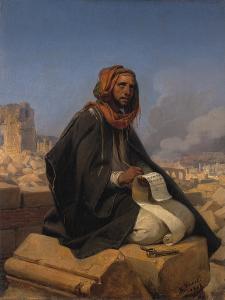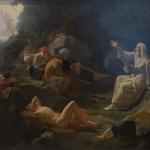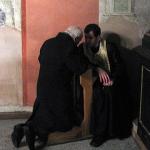
This post reflects on the film, The Book of Eli, and the importance of preserving, properly interpreting, and applying the Bible to our lives today to guard against a dystopian future. It is the first in a series of posts reflecting on the interface between biblical-theological themes and pop culture.
The Book of Eli and Biblical Illiteracy
I was reflecting on the film, The Book of Eli, the other night. Like in the movie, it’s almost as if we are living in a post-apocalyptic world where biblical illiteracy abounds. People are often unaware of “The Book” and no longer have a sense of its overarching presentation of where we come from and where we are going.
Eli, played by Denzel Washington, wants to help people remember The Book and to move forward in the path of wisdom. He is living in a post-apocalyptic world in which there is only one remaining copy of the Bible. It is in his possession. He had heard a voice thirty years ago that instructed him to find and protect The Book. He was to journey across the land to the West and entrust it to those who would preserve it and its power to liberate for posterity (You can watch the trailer here). In what immediately follows, we will reflect on two approaches to knowledge and truth and their respective impact—to liberate or to manipulate.
Knowledge and the Power to Liberate
Eli understands that knowledge of The Book can serve to enlighten and liberate. Knowledge—as in biblical wisdom—is power. Those who understand history don’t repeat its mistakes. One of the greatest mistakes that leads to forgetting history and repeating its mistakes is burning or destroying books (Refer here for an analysis that connects The Book of Eli to Ray Bradbury’s Fahrenheit 451). Rather than burn classic books like the Bible, as King Jehoiakim did with the biblical prophet Jeremiah’s scroll, the souls of people like Jeremiah and Eli burn to preserve them.
The Bible provides Eli with direction for life. Eli’s high regard for the Bible appears to match the psalmist’s valuation. The psalmist declared, “Your word is a lamp for my feet and a light for my path.” Eli quotes from Psalm 23: the Lord provides for him, makes a path for him, and protects him amid grave dangers on his journey, as Eli walks by faith, not by sight. Like Jeremiah of old, who faithfully disclosed God’s Word to his people in the effort to spare them from impending and later further disaster (as shown above in the picture), Eli’s aims were courageous and noble. He is committed to preserving The Book for posterity. Knowledge of The Book is powerful and life-giving. Biblical knowledge can liberate people’s hearts and minds so they might flourish.
Knowledge and the Power to Manipulate
Not everyone shares Eli’s view that knowledge of the truth is power that should be shared to liberate people. Bill Carnegie played by Gary Oldman reflects the view that power is knowledge. Those who have power create truth to manipulate the masses. He understands that The Book is far more than words in a collection of bound pages. These words can either free people or bind them.
Carnegie sees The Book as a weapon he can use to control “the hearts and minds of the weak and the desperate.” He wants power to create his own truth, misinterpreting Scripture to manipulate and suppress others’ lives and eventually rule the world. (Check out this exchange with Eli where Carnegie reveals his motive for coveting The Book). Carnegie will do anything to get Eli to surrender The Book, even if it involves killing him or others in the process.
Eli, Carnegie, and Us: Who Do We Emulate?
Which of these two figures do we emulate? Are we more like Eli or Carnegie? Like Jeremiah or one of the false prophets who opposed him? Will we guard The Book’s message with our lives as Eli did for the sake of posterity? Or like Carnegie, will we distort its message in the attempt to master life and others in the process? History is full of examples of people who have chosen the conflicting paths of Eli and Carnegie, and the Bible narrates both approaches. It’s important that we remember biblical history and choose the better path, the one that brings life.
Now for those of us who choose the path of Eli, will we realize that it is not simply safeguarding and carefully reading The Book that is important? If we really take it seriously, we will obey its teachings. Like Eli, we need to realize the importance of living out what we learn.
The Book and the Importance of Learning to Live It
The realization that he must not simply preserve and learn from The Book but live out its teaching dawns on Eli much later in the film. Carnegie is finally able to get Eli to surrender The Book when Carnegie threatens to harm Eli’s friend Solara, played by Mila Kunis. Solara is taken by complete surprise:
Solara: “I didn’t think you’d ever give up the book, I thought it was too important to you.”
Eli: “It was, I was carrying and reading it every day, got so caught up in protecting it, I forgot to live by what I’d learnt from it.”
Solara: “And what’s that?”
Eli: “To do more for others than you do for yourself” (Refer here to IMDb’s selection of quotes from the film from which these lines are taken).
This realization and actualization in saving his friend at great cost to himself (click here and here for portions of the movie scene) is reminiscent of Jesus’ words in Luke 10 to the religious leader who understood the meaning of the story of “The Good Samaritan.” Jesus commends the Samaritan who risks his own life and cares sacrificially for a total stranger beaten horribly on the road and left for dead.
In closing, it wasn’t enough to understand the meaning of the story and the Bible’s teaching to experience eternal life. As Jesus exhorted the religious leader, one must live it out: “Do this and you will live” (Luke 10:28). Like Jesus, the Samaritan, and Eli, may we do more for others than we do for ourselves. Let’s live out the liberating truth that we’ve learned.














